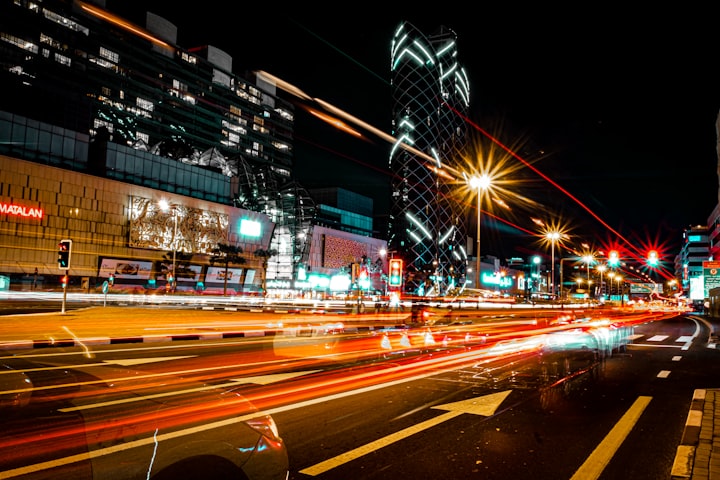First World Problems
...and Third World results
The American passenger said angrily into his phone, ‘Within the blasted marmalade!’
Fahad glanced in the mirror, appraising the man for a sense of the words. What was he speaking of with such emotion? Why would an orange jam deserve such anger? The passenger was well-dressed for the heat, a businessman clearly, though his shirt was unbuttoned at the neck and the tie dangled drunkenly. Dark hair, closely cut, a Movado at his wrist, wedding ring.
It was a Friday afternoon. Fahad was accustomed to drunk Western passengers on a Friday afternoon.
He’d been on the roads since 6 am, and soon enough would pass the taxi over to Imran, his assigned partner, an Indian, from Amritsar. He and Fahad shared a flat in Al Barsha, but Fahad only really spoke to Imran when passing the cab over, at 6 am and 6 pm. Imran, Fahad reflected, liked marmalade and all things English. Scones. Clotted cream. And Indian whiskey, a double travesty.
Fahad preferred the American side of things: Hollywood movies, Coca Cola, the solitary man-in-the-desert wildness of the cowboy.
The marmalade that Imran brought to their little room, and which he insisted on eating with dry white bread instead of chapati, had proved, in fact, to be a barrier between the two men ever establishing much of a friendship at all.
Maybe he was wrong. Maybe the passenger was English.
Fahad said to the mirror, when the passenger stabbed at the phone’s screen and put it aside, ‘English?’
‘What?’ the man said, still angry.
‘Are you English sir?’ Fahad ventured cautiously now. Angry Westerners after a Dubai brunch could be trouble.
‘Shit no,’ he said. ‘Merican.’
‘So sorry,’ Fahad said. ‘I am not liking the English. Too much drinking. Too much fighting.’ Plus what they did to Pakistan, but he lacked the exit ramp to that topic, and the vocabulary, though that had never posed an obstacle to Fahad engaging in conversation with his passengers.
‘What the hell are you talking about?’ the American said.
Fahad could not afford another complaint, but his curiosity and need to talk often led him down paths like this, of inexplicable anger and confusion.
‘I am driving two years Dubai, sir,’ Fahad said. ‘The English very angry mens.’
‘Huh,’ the passenger said.
The problem was that you were not supposed to know what passengers said back there. Cell phone conversations. Business talk. Spouses and families and their domestic concerns. You could not choose not to hear, but you had to choose not to listen, and Fahad had never been successful not listening, even back home in Rawalpindi. Thus his well-intentioned advice to the Egyptian woman about her lazy housekeeper had earned him a complaint with management. As well the suggestion to not shop at Carrefour to the Parisian lady, the opinion on Umm Al-Quwain and alcohol, and of course his views on Pakistan’s Prime Minister.
They had come from the Westin Hotel in Jumeirah, from presumably the Bubbalicious Brunch there, and were on Sheik Zayed in medium traffic, spurting along in 40 kilometer an hour bursts between exits, performing Fahad’s well-practiced steering wheel and gas pedal dance among the Bentleys and Porches and ubiquitous Mercedes. The cab was a Toyota.
The Bubbalicious brunch, Fahad had been told, cost 500 dirhams, two weeks of salary, and had food and drink the likes of which he would never, he understood, ever experience in his life. (A prediction that proved all too soon to be true.) Even if he had been able to afford it, had saved for two weeks just to go, or earned some fantastic tip from some generously drunk American like this one, he’d never be allowed inside.
He wanted to ask about the damned marmalade now. Maybe the American’s hatred of marmalade provided a common ground to understand each other. That bitter bitter rind of orange ruining an otherwise perfectly good jam.
He risked it. ‘What is wrong with marmalade, sir?’
It was a question never to be answered, but one that he would frequently ponder for years to come, after the taxi company let him go a few days later and sent him back to Rawalpindi, and the meager desperate life that followed. He was never told why he was let go and all he carried home was the question of it.
For the American said, angrier than ever, ‘That’s none of your goddamned business,’ and sat back in silence for the rest of the short trip.
And left no tip.
About the Creator
Bernard Bleske
Let's see what happens...







Comments
There are no comments for this story
Be the first to respond and start the conversation.